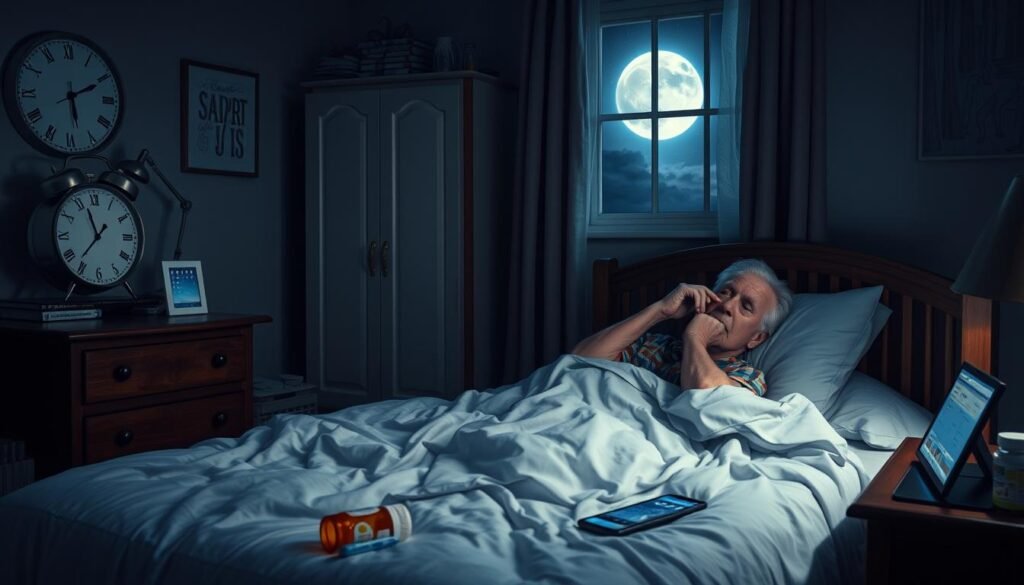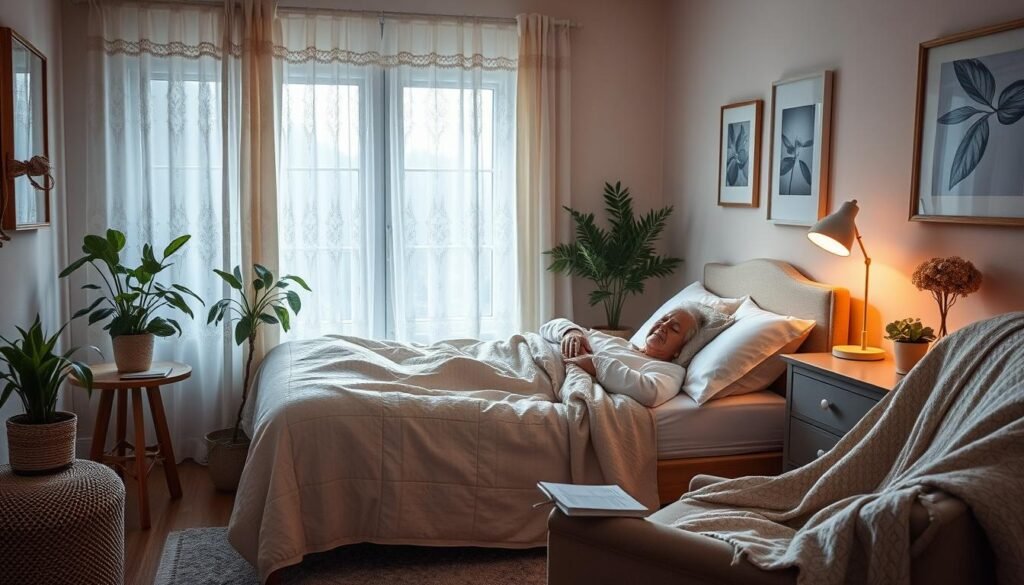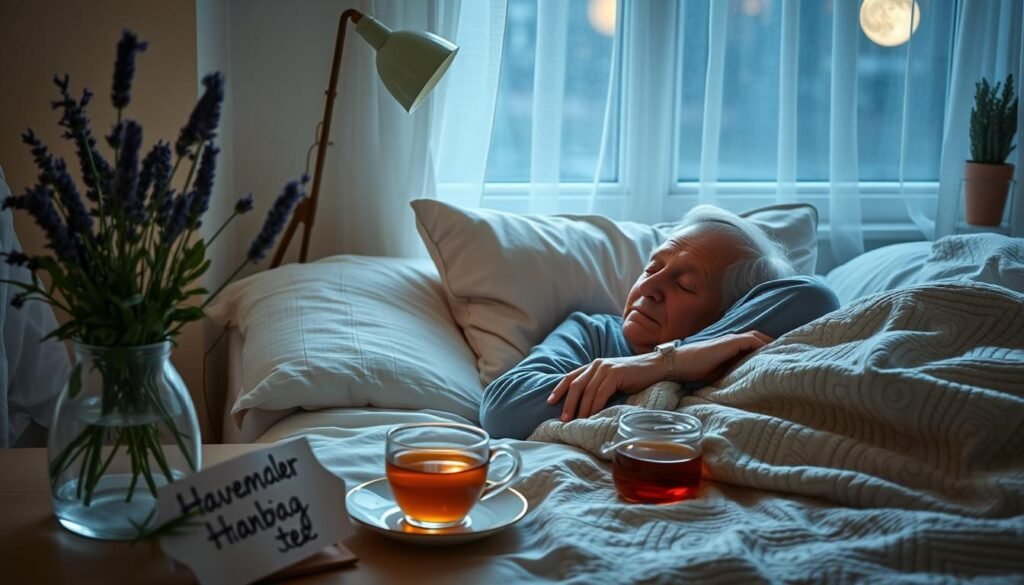Did you know more than half of older adults deal with insomnia? This issue sees an increase of 5% to 8% each year. This fact signals a rising concern about sleep problems among seniors. Insomnia isn’t just rare sleepless nights. It means having constant trouble sleeping, whether starting, staying asleep, or not sleeping well, even when they can rest.
As people get older, their sleep patterns change. This can lead to broken sleep and more wakefulness at night. It’s essential for both the elderly and their caregivers to recognize these changes. This way, they can find the best ways to treat sleep issues in seniors.
Key Takeaways
- Over half of older adults suffer from insomnia.
- Insomnia is characterized by difficulties in falling asleep or staying asleep.
- Aging is associated with changes in sleep patterns, including decreased sleep efficiency.
- Identifying and addressing insomnia can enhance overall health and well-being in seniors.
- Effective treatment options include both behavioral approaches and potential medicinal aids.
Overview of Insomnia in the Elderly
Insomnia is a big problem for many older adults. It leads to feeling tired during the day and a lower quality of life. Understanding the issue is key to handling it well. People with insomnia might find it hard to fall asleep or wake up often at night. Spotting these signs early helps in tackling the problem quickly.
Definition and Symptoms of Insomnia
Insomnia means having trouble sleeping even when you have the chance. The problems include:
- Sleep-onset insomnia: Hard to start sleeping.
- Sleep-maintenance insomnia: Waking up many times at night.
- Early morning awakening: Getting up too early and not being able to sleep again.
About half of older adults say they have insomnia symptoms. Chronic insomnia lasts at least three months and affects everyday life. It happens several times a week.
Prevalence of Insomnia in Older Adults
A lot of older adults struggle with sleep problems. Between 10-30% of adults have insomnia. This issue grows as people age, especially after 60. As we get older, we sleep less by about 27 minutes every decade. Studies also show older people don’t get as much deep sleep or dream sleep as younger ones. This changes how well they sleep.
Plus, many older people have a hard time with their body’s sleep clock. This can lead to feeling sleepy early in the evening and waking up early. It’s hard for them to get enough good sleep.
Causes of Insomnia in Older Adults
Understanding causes of insomnia in older adults means looking at many factors. These factors affect their sleep. As people get older, their sleep patterns change. This can greatly affect their rest and health.
Natural Changes in Sleep Patterns
Older adults need about 7 to 8 hours of sleep each night. But, they often get less deep sleep. They may wake up many times during the night. This happens even if they’re healthy.
They spend less time in deep, “slow-wave” NREM sleep. This makes their sleep broken. So, it’s hard for them to get good rest.
Medical Conditions Affecting Sleep
Many medical conditions can disrupt sleep in older adults. Issues like heart failure, chronic pain, and diabetes can cause insomnia. Mental health problems like depression and anxiety make it worse.
These health problems make sleep hard. Older adults struggle to fall and stay asleep. Drinking caffeine or alcohol before bed also hurts sleep quality.
Impact of Medications on Sleep Quality
Medications can impact sleep quality a lot. Many older adults take medicines that may cause insomnia. These include antidepressants and high blood pressure meds.
These drugs can mess with sleep. It’s important to talk with doctors about these effects. Understanding how medications affect sleep is key to better rest for the elderly.
To learn more about improving sleep for older adults, look into detailed studies. For example, check out this study. Understanding these issues can help find the right treatment plans.
Effects of Insomnia on the Elderly
Insomnia greatly affects the health of the elderly. It hurts their daily life and can cause serious health problems. It’s key to understand these effects to help improve the well-being of older adults.
Impact on Physical Health
Insomnia has a big impact on an older person’s physical health. People over 55 who can’t sleep well face a higher risk of getting sick. About half of them struggle to fall asleep or stay asleep.
This lack of sleep can lead to heart diseases and sleep apnea. Around 20-60% of seniors suffer from sleep apnea, adding to their health woes. Poor sleep can also weaken their immune system, making them get sick more easily.
Emotional and Mental Health Consequences
Insomnia can make people feel more irritable, anxious, and depressed. It badly affects mental health and can lead to memory problems. Experts say that therapy, like cognitive behavioral therapy (CBT), is a good way to fight these issues.
Not getting enough sleep makes people tired during the day, making all tasks harder. This can lower their life quality. For seniors, it’s crucial to treat insomnia with great care to improve their emotional health.
Risk Factors for Insomnia in the Aged
Knowing what makes older people have trouble sleeping is key. As we age, our bodies change a lot. These changes greatly impact our sleep. For example, light sleep increases but deep sleep decreases. This can make overall sleep quality worse, leading to health issues.
Aging-Related Changes
As we get older, our bodies go through many changes. These changes can make sleeping hard. For example, changes in melatonin can mess up our sleep patterns. This makes it tough to fall and stay asleep. Waking up a lot at night can make insomnia worse. This shows sleep quality drops as we age.
Lifestyle Factors
How we live our lives can affect sleep too, especially for the elderly. Not moving much, bad sleep habits, and feeling lonely can make sleep problems worse. Doing things like napping during the day or drinking caffeine or alcohol can mess up sleep. Studies show that older adults who drink a lot often have trouble sleeping. By understanding these lifestyle factors affecting sleep quality, we can find ways to help people sleep better.

| Risk Factors | Description |
|---|---|
| Aging-Related Changes | Increased stage 1 sleep, hormonal shifts, decreased deep sleep stages. |
| Sedentary Lifestyle | Lack of physical activity leading to diminished sleep quality. |
| Poor Sleep Hygiene | Irregular sleep schedules, heavy meals before bedtime. |
| Social Isolation | Loneliness can lead to increased anxiety and sleep disturbances. |
| Substance Use | Caffeine and alcohol consumption negatively impacting sleep patterns. |
By understanding these risk factors, caregivers and healthcare workers can help older adults sleep better. This improves their life quality. For more information on insomnia and its risks, you can check studies here.
Insomnia Prevalence in Geriatric Population
About 30% of seniors report trouble sleeping, showing how common insomnia is among them. This issue is a big concern for public health. Statistics on insomnia among seniors provide important insight into the problem.
Statistics on Insomnia Among Seniors
A study showed that out of 400 participants, 120 had insomnia, making the rate 30%. Insomnia prevalence in geriatric population studies show differences among genders. Men had insomnia at a rate of 22.9%, while women had it at 37.2%.
Many things lead to sleep problems in older adults. These include:
- Gender differences
- Depressive symptoms
- Short sleep duration
- Using sleep meds
- Risk of sleep apnea (OSA)
- Restless leg syndrome (RLS)
Insomnia can affect up to 40% of people over 65. It’s more common in women. They often struggle with falling asleep, staying asleep, and feeling tired during the day.
Comparative Data: Older Adults vs. Younger Adults
Older and younger adults face different sleep problems. While 10-30% of the young experience this, the numbers are higher in the elderly. This shows the need for special care.
| Age Group | Prevalence of Insomnia |
|---|---|
| Older Adults (65+ years) | Up to 40% |
| Adults (18-64 years) | 10-30% |
Elderly Insomnia Treatment Options
Finding effective elderly insomnia treatment requires looking into different strategies. It’s common for seniors to have insomnia. So, we use non-drug methods as the first step. These approaches focus on better sleep habits and correcting wrong ideas about sleep. This helps seniors get into healthier sleeping routines.
Non-Pharmacological Approaches
Many drug-free methods have been successful for sleep problems in the elderly. Cognitive Behavioral Therapy for Insomnia (CBT-I) is highly recommended. It teaches people to change how they think and act about sleep. Other helpful actions include:
- Keeping a steady sleep schedule
- Making the bedroom comfy for sleeping
- Cutting down on naps
- Watching intake of caffeine and alcohol
- Staying active
Making changes in your lifestyle is key to beating insomnia. These changes can make a big difference even before thinking about other treatments.
When to Consider Medication
If natural methods don’t help, it might be time for meds. Choosing medication for insomnia in the elderly needs careful thought. This is due to higher risks in older people. Since many are already on various meds, it’s crucial to look at drug interactions. Medication options include:
| Insomnia Type | Recommended Medications |
|---|---|
| Difficulty Falling Asleep | Eszopiclone (Lunesta), Ramelteon (Rozerem), Zolpidem tartrate (Ambien) |
| Difficulty Staying Asleep | Doxepin hydrochloride (Silenor), Suvorexant (Belsomra), Temazepam (Restoril) |
Choosing the right medication needs careful planning. Side effects like daytime sleepiness or confusion can happen. Often, using non-drug methods together with carefully picked medications works best. This mix helps seniors sleep better.

For more details, check out current research on elderly insomnia treatments.
Managing Insomnia in the Aged
To manage insomnia in the elderly effectively, it’s key to set up the right sleep setting and a regular sleep schedule. These steps are crucial for seniors to sleep better.
Creating a Sleep-Friendly Environment
Getting a sleep-friendly space ready is crucial for seniors with insomnia. Important parts of this include:
- Darkness: Make sure the bedroom stays dark by using blackout curtains.
- Quiet: Cut down on noise with earplugs or sound machines.
- Temperature: A cool room, preferably between 60-67°F, is best for sleep.
- Bed Usage: Only use the bed for sleeping to teach the brain it’s for resting.
Establishing a Consistent Sleep Routine
Having the same sleep routine is key for the elderly fighting insomnia. They should try to:
- Go to bed and get up at the same time every day, weekends included.
- Do calming activities before bed, like reading or some easy stretches.
- Stay away from screens for at least an hour before going to sleep.
- Don’t drink caffeine or alcohol too close to bedtime.
By following these steps, older adults can really better their sleep and health. A sleep-friendly place and a steady sleep routine make a big difference in fighting insomnia.
Natural Remedies for Elderly Insomnia
Many seniors seeking solutions for sleepless nights find comfort in natural remedies for elderly insomnia. Among these options, herbal supplements for sleep have gained popularity. They are known for their potential benefits in promoting relaxation and better sleep quality.
Herbal Supplements and Their Benefits
Herbal supplements can play a significant role in enhancing sleep for older adults. Valerian root, with a typical dose of 400–900 mg before bedtime, has shown effectiveness. It improves sleep duration.
Chamomile extract, recognized for its calming properties, has been proven to significantly enhance sleep quality among seniors. Melatonin, a hormone naturally released by the body, can be taken in doses of 1–5 mg. This helps regulate the sleep-wake cycle, making it easier to fall asleep.
Incorporating magnesium-rich foods, like bananas or warm milk, about an hour before bed may also promote sleepiness and restful nights.
Mindfulness and Relaxation Techniques
Mindfulness techniques for improving sleep have gained traction among older adults. Practices such as progressive muscle relaxation and mindful meditation can effectively reduce anxiety. This makes it easier to drift off to sleep.
A study indicated that mindful meditation interventions helped decrease total wake time for individuals with chronic insomnia. Creating a calming bedtime routine, free from screens and bright lights, coupled with a quiet and dark environment, can further enhance sleep quality.

Lifestyle Changes for Better Sleep in Seniors
Making some changes in daily habits can help seniors sleep better. This improves their night’s rest and overall well-being. Key factors include exercising regularly and eating right.
Importance of Regular Exercise
Regular physical activity is key to better sleep for seniors. Activities like walking, biking, or swimming adjust sleep patterns for deeper rest. Try to get 30 minutes of exercise most days.
Even simple moves like stretching or light yoga are good. Exercise boosts physical health, mood, and reduces anxiety. This makes it easier to relax and sleep well.
Dietary Considerations for Sleep Improvement
What seniors eat affects how well they sleep. To sleep better, it’s smart to cut down on caffeine and alcohol before bed. Eating foods like bananas, almonds, and oatmeal helps too.
Having regular meal times and avoiding big meals before sleeping makes a difference. For more tips on better sleep, see natural sleep aids and home remedies.
Conclusion
It’s key to understand how sleep solutions for elderly insomnia work. Many seniors, around 30% to 48%, struggle with sleep. These sleep issues can greatly affect their health. By looking into special treatments and lifestyle changes, both caregivers and seniors can improve sleep quality.
Research shows that those over 65 often face insomnia. This can hurt their physical and mental health. Older women, particularly if they’re divorced or widowed, are more at risk. An overview of insomnia in older adults reveals that symptoms may lessen over time. Yet, taking action early leads to better sleep.
Teaching seniors and caregivers about insomnia can help them find better sleep. They can try changes in their lifestyle or different treatments. This can make restful sleep more possible for our elders. Focusing on these methods can greatly improve their daily life and well-being in the long run.